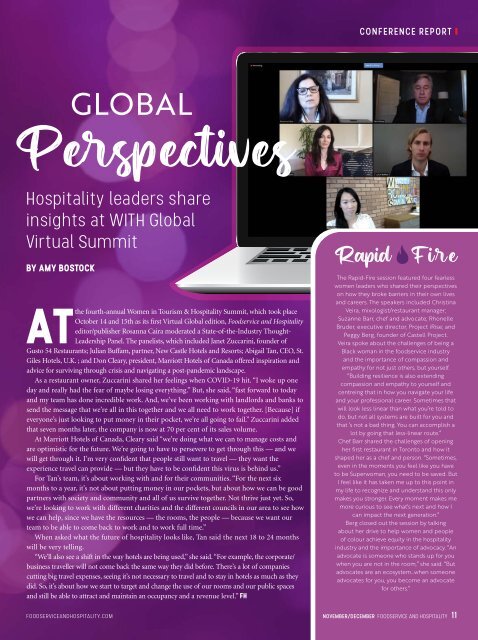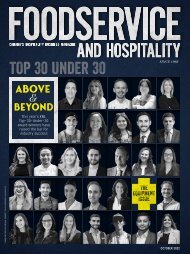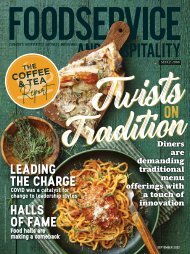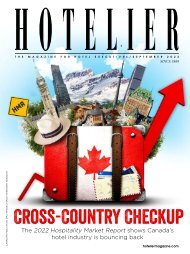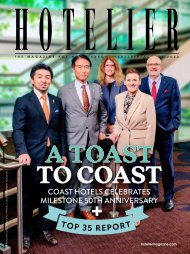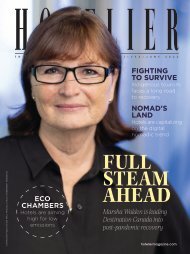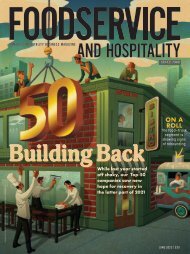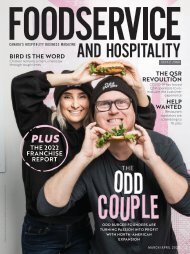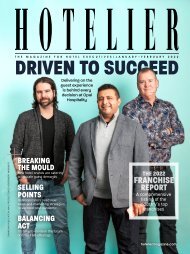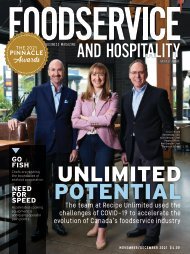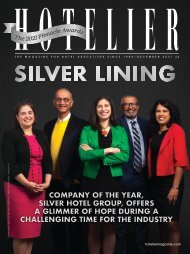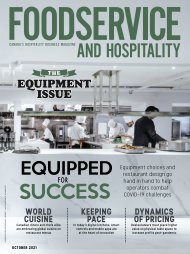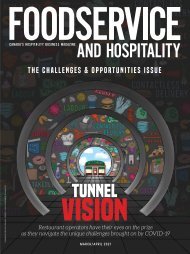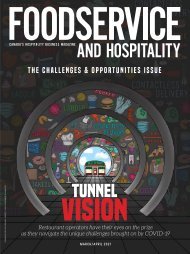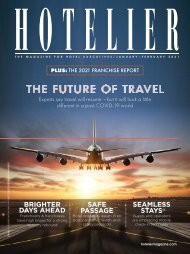November/December 2020
November/December 2020 issue of Foodservice and Hospitality magazine.
November/December 2020 issue of Foodservice and Hospitality magazine.
You also want an ePaper? Increase the reach of your titles
YUMPU automatically turns print PDFs into web optimized ePapers that Google loves.
CONFERENCE REPORT<br />
GLOBAL<br />
Perspectives<br />
Hospitality leaders share<br />
insights at WITH Global<br />
Virtual Summit<br />
BY AMY BOSTOCK<br />
AT Leadership Panel. The panelists, which included Janet Zuccarini, founder of<br />
FOODSERVICEANDHOSPITALITY.COM<br />
the fourth-annual Women in Tourism & Hospitality Summit, which took place<br />
October 14 and 15th as its first Virtual Global edition, Foodservice and Hospitality<br />
editor/publisher Rosanna Caira moderated a State-of-the-Industry Thought-<br />
Gusto 54 Restaurants; Julian Buffam, partner, New Castle Hotels and Resorts; Abigail Tan, CEO, St.<br />
Giles Hotels, U.K. ; and Don Cleary, president, Marriott Hotels of Canada offered inspiration and<br />
advice for surviving through crisis and navigating a post-pandemic landscape.<br />
As a restaurant owner, Zuccarini shared her feelings when COVID-19 hit. “I woke up one<br />
day and really had the fear of maybe losing everything.” But, she said, “fast forward to today<br />
and my team has done incredible work. And, we’ve been working with landlords and banks to<br />
send the message that we’re all in this together and we all need to work together. [Because] if<br />
everyone’s just looking to put money in their pocket, we’re all going to fail.” Zuccarini added<br />
that seven months later, the company is now at 70 per cent of its sales volume.<br />
At Marriott Hotels of Canada, Cleary said “we’re doing what we can to manage costs and<br />
are optimistic for the future. We’re going to have to persevere to get through this — and we<br />
will get through it. I’m very confident that people still want to travel — they want the<br />
experience travel can provide — but they have to be confident this virus is behind us.”<br />
For Tan’s team, it’s about working with and for their communities. “For the next six<br />
months to a year, it’s not about putting money in our pockets, but about how we can be good<br />
partners with society and community and all of us survive together. Not thrive just yet. So,<br />
we’re looking to work with different charities and the different councils in our area to see how<br />
we can help, since we have the resources — the rooms, the people — because we want our<br />
team to be able to come back to work and to work full time.”<br />
When asked what the future of hospitality looks like, Tan said the next 18 to 24 months<br />
will be very telling.<br />
“We’ll also see a shift in the way hotels are being used,” she said. “For example, the corporate/<br />
business traveller will not come back the same way they did before. There’s a lot of companies<br />
cutting big travel expenses, seeing it’s not necessary to travel and to stay in hotels as much as they<br />
did. So, it’s about how we start to target and change the use of our rooms and our public spaces<br />
and still be able to attract and maintain an occupancy and a revenue level.” FH<br />
Rapid Fire<br />
The Rapid-Fire session featured four fearless<br />
women leaders who shared their perspectives<br />
on how they broke barriers in their own lives<br />
and careers. The speakers included Christina<br />
Veira, mixologist/restaurant manager;<br />
Suzanne Barr, chef and advocate; Rhonelle<br />
Bruder, executive director, Project iRise; and<br />
Peggy Berg, founder of Castell Project.<br />
Veira spoke about the challenges of being a<br />
Black woman in the foodservice industry<br />
and the importance of compassion and<br />
empathy for not just others, but yourself.<br />
“Building resilience is also extending<br />
compassion and empathy to yourself and<br />
centreing that in how you navigate your life<br />
and your professional career. Sometimes that<br />
will look less linear than what you’re told to<br />
do, but not all systems are built for you and<br />
that ‘s not a bad thing. You can accomplish a<br />
lot by going that less-linear route.”<br />
Chef Barr shared the challenges of opening<br />
her first restaurant in Toronto and how it<br />
shaped her as a chef and person. “Sometimes,<br />
even in the moments you feel like you have<br />
to be Superwoman, you need to be saved. But<br />
I feel like it has taken me up to this point in<br />
my life to recognize and understand this only<br />
makes you stronger. Every moment makes me<br />
more curious to see what’s next and how I<br />
can impact the next generation.”<br />
Berg closed out the session by talking<br />
about her drive to help women and people<br />
of colour achieve equity in the hospitality<br />
industry and the importance of advocacy. “An<br />
advocate is someone who stands up for you<br />
when you are not in the room,” she said. “But<br />
advocates are an ecosystem…when someone<br />
advocates for you, you become an advocate<br />
for others.”<br />
NOVEMBER/DECEMBER FOODSERVICE AND HOSPITALITY 11


